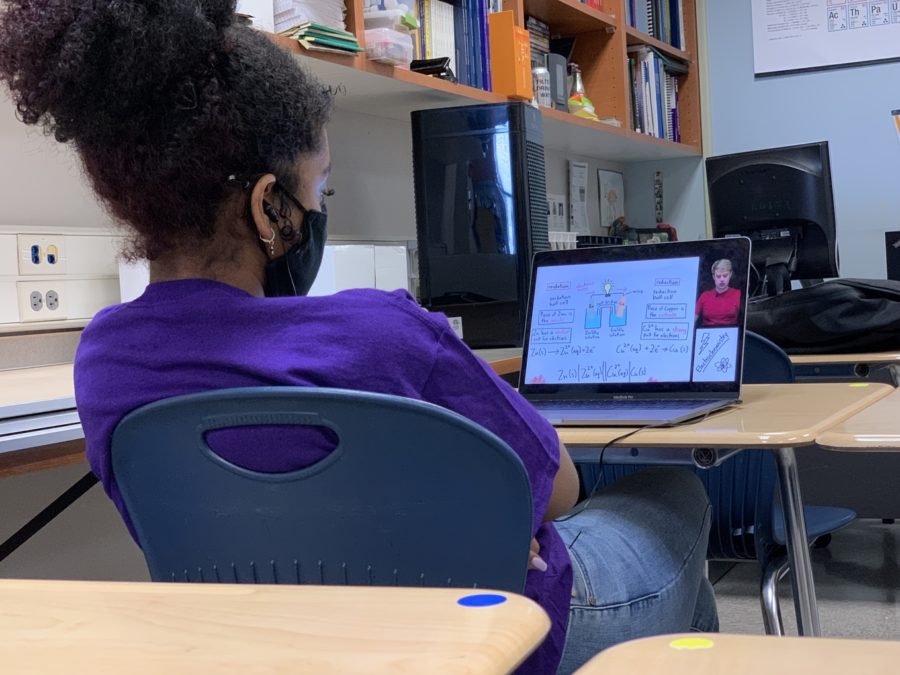Testing in AP classes must change
Working hard or hardly working?: A student focuses on their current science unit.
May 5, 2021
Every year around AP testing season, the blood pressures of high schoolers across the country reache a dangerous boiling point. Adding to this stress is the fact that tests in AP classes offered in Edina High School mimic the conditions of the actual exam. Students in AP World, for instance, might have to write a timed Document Based Question essay; in AP Statistics or AP Calculus, timed multiple choice and free response sections keep students up late into the night cowering in fear. These universal experiences often lead to one question: are such stressful testing environments really the best way for students to learn? The answer is a definite no.
Test anxiety is a well-researched phenomenon that is far more serious than the typical amount of pre-exam stress. The concept refers to a psychological condition that causes a debilitating sense of fear before an exam, making it impossible for the individual to perform at their highest standards. According to the American Test Anxieties Association, up to 20% of students suffer from crippling test anxiety, and only a small fraction of these students ever overcome it.
The impacts of the condition have proven to be severe. Sian Beilock, cognitive scientist and President of Barnard College, explains that high anxiety while taking tests has a detrimental impact on a student’s achievement, especially for highly intelligent and self-critical students. Specifically, research has shown that timed tests and other high-intensity test settings cause so much stress to the brain that the working memory is blocked by fear, making it extremely difficult to remember the information needed to perform well on a test. In essence, the very format of a timed test, which was designed to increase memorization skills, ends up having the opposite effect. Most significantly, the Anxiety and Depression Association of America writes that test anxiety leads to students feeling intense hopelessness and despair, trapping them in a cycle of depression.
Nowhere is this research more clearly elucidated than in an AP classroom. While AP classes are designed to provide an opportunity for highly motivated students to learn information at a college level, they consistently sacrifice knowledge for perfection. Each test taken in these classes is timed, clearly exacerbating the issue of test anxiety.
The prestigious stigma that surrounds these courses only increases an already stressful environment. AP students are expected to complete hours of homework every night, they are expected to be the smartest students in the school, and they are seen as individuals who should be prepared for the stress of the class. But the intense expectations placed on AP students make every test seem like an opportunity for failure. As summative exams become life-or-death scenarios, students’ joy in learning substantially decreases. Instead of waking up excited to enter the classroom, students often become solemn and quiet. The noise within the classroom withers away as the leg bouncing rapidly increases.
Decreasing stress from a student’s life is important in any year of school, but it becomes especially imperative in a pandemic. COVID-19 has not only changed the way teenagers’ social relationships operate, but it has also highly altered every aspect of education, including AP exams. With a completely new format of online testing for the exam, information on testing structures and new techniques have not been provided. Many students struggle with attempting to figure out the date of their exams, let alone the logistics of submitting the actual test. Others are overwhelmed with a lack of knowledge on how to effectively study. A teacher’s job during these times ought to be to reduce stress, not add to it with minimal information and an unchanged format of high-anxiety testing.
Instead of creating heightened dread by enforcing timed tests that invariably lead to an onslaught of failing grades, AP classes should focus on how to adapt to the changing circumstances in order to reduce extra anxiety placed on students. Doing so involves creating equity in testing by allowing for increased time to take exams. It also involves providing clear instructions on the structure of AP exams and informing students on how to prepare. Ultimately, the focus of a student’s day in school should be on learning engaging material, not on competing for unachievable perfection.



